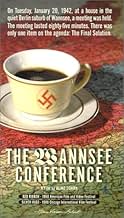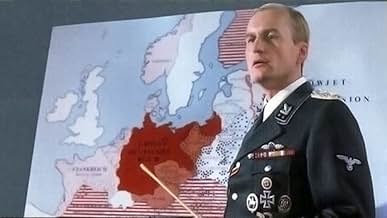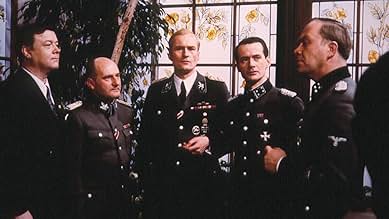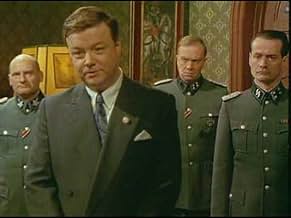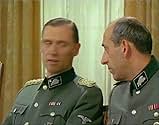NOTE IMDb
7,7/10
1,4 k
MA NOTE
Ajouter une intrigue dans votre langueAt the Wannsee Conference on January 20, 1942, senior Nazi officials meet to determine the manner in which the so-called "Final Solution to the Jewish Question" can be best implemented.At the Wannsee Conference on January 20, 1942, senior Nazi officials meet to determine the manner in which the so-called "Final Solution to the Jewish Question" can be best implemented.At the Wannsee Conference on January 20, 1942, senior Nazi officials meet to determine the manner in which the so-called "Final Solution to the Jewish Question" can be best implemented.
- Réalisation
- Scénario
- Casting principal
Friedrich G. Beckhaus
- Heinrich Müller
- (as Friedrich Beckhaus)
Hans-Werner Bussinger
- Martin Luther
- (as Hans W. Bussinger)
Werner Asam
- Heydrich's Adjutant
- (non crédité)
Avis à la une
Far above the bathetic histrionics of Kenneth Branagh in the recent "Conspiracy", this crisply chilling, almost real-time reenactment is among the most convincing works of historical evocation on celluloid.
Not so much because its overall interpretation is historically valid: as I noted in my review of "Conspiracy", there are grave doubts whether the Wannsee meeting can bear anything like the watershed significance historians imputed to it between c. 1960 and 1980. More recent research has pointed to the Conference being more or less what the one remaining "Protokoll" (summary minutes) stated: a second-level pow-wow of bureaucrats to arrange for the deportation of Jews to the German-occupied East, not a master plan for their destruction cooked up by leading Nazis.
But that is by the way. "Wannseekonferenz" ably conveys the peculiar ethos of German (by no means all Nazi) officials and soldiers in the pivotal years of World War Two, when the nation seemed to be on top of Europe but was already getting jitters about its staying power. As the Interior Ministry's moderate Dr Stuckart, between wipes of his nose, points out: neither the British Empire nor the Soviet Union has yet been defeated, America is about to join in (the date is a month after Pearl Harbor) and there is danger in sweeping assimilated Jews and mixed-race people out of the Reich. Some will escape to become mortal enemies of it when they might be co-opted. Other participants crudely call for total banishment of Jewry from the Altreich and the Polish "Generalgouvernement", grumbling about disease; but there are war-production and morale arguments on the other side, and the uniforms who start by seeming to spring wholesale evacuation on the suits as a fait accompli- Heydrich and "my Jewish consultant, Eichmann"- are willing to ponder exemptions.
All this is a far cry from the Goldhagenesque "eliminationist antisemitism" uncritically portrayed in "Conspiracy". The German film is a more plausible picture of the clashes and compromises, the tired banter and one-upmanship, the relief of dirty jokes and the solemn courtesies one would expect of a gaggle of Teutonic bureaucrats who don't feel as assured of victory as they have to pretend. The film is little more than facial expressions and dialogue, batted to and fro across the table; but every actor is right inside his part. The sense of a warped community is potent, and the prowling encirclement by Heinz Schirk's camera reinforces this solidarity instead of just trying to fluff up the monotony of a bunch of men (and one shockable stenographer) talking.
Dietrich Mattausch looks far more like the real Reinhard Heydrich- tall, elegant fencer and violinist with a streak of treachery- than stocky little Branagh. His unfailing politeness, with a hint of cold steel underneath, is more convincing than Branagh's Demon King. This man knows what he wants, but his chairmanship is skilfully emollient.
Gerd Bockmann's Eichmann is assiduous and dispassionate like the real Adolf E, who had no great personal animus towards Jews but was determined to get ahead in his sordid profession of "dispatcher". Peter Fitz as Stuckart, the Jonah of the gathering, hints at distaste for the whole business while manfully arguing a pragmatic case for letting sleeping dogs lie. Among the smaller parts, Martin Luttge as Major Dr Rudolf Lange- intellectual turned persecutor in an SS Special Action Group- stands out for his affectation of rough, half-reluctant practicality, telling civilian papershufflers the score.
Inevitably a few embroideries have crept in: Heydrich's pursuit of the secretary, Lange's dog, the contemptuous anecdote about the Papal Nuncio. As if tacitly admitting the lack of hard evidence for orchestrated genocide from the minutes, the screenplay chucks in a throwaway line: Heydrich speaks of finding a new way of killing Jews fast by "learning to take the Fuhrer literally". Stuckart tells Dr Kritzinger that this refers to a "Mein Kampf" passage about how the Great War could have been won if subversive, high-ranking German Jews back home had been held under poison gas. We are supposed to infer a whiff of Zyklon B from this; but as is clear in context, Hitler meant that those Jews should have had to inhale British poison gas as front-line soldiers, like himself.
Such gaseous garnishings were probably required to make the film an accepted part of the curriculum in the guilt-ridden German system of historical re-education. But they do not seriously detract from this superbly atmospheric chamber piece.
Not so much because its overall interpretation is historically valid: as I noted in my review of "Conspiracy", there are grave doubts whether the Wannsee meeting can bear anything like the watershed significance historians imputed to it between c. 1960 and 1980. More recent research has pointed to the Conference being more or less what the one remaining "Protokoll" (summary minutes) stated: a second-level pow-wow of bureaucrats to arrange for the deportation of Jews to the German-occupied East, not a master plan for their destruction cooked up by leading Nazis.
But that is by the way. "Wannseekonferenz" ably conveys the peculiar ethos of German (by no means all Nazi) officials and soldiers in the pivotal years of World War Two, when the nation seemed to be on top of Europe but was already getting jitters about its staying power. As the Interior Ministry's moderate Dr Stuckart, between wipes of his nose, points out: neither the British Empire nor the Soviet Union has yet been defeated, America is about to join in (the date is a month after Pearl Harbor) and there is danger in sweeping assimilated Jews and mixed-race people out of the Reich. Some will escape to become mortal enemies of it when they might be co-opted. Other participants crudely call for total banishment of Jewry from the Altreich and the Polish "Generalgouvernement", grumbling about disease; but there are war-production and morale arguments on the other side, and the uniforms who start by seeming to spring wholesale evacuation on the suits as a fait accompli- Heydrich and "my Jewish consultant, Eichmann"- are willing to ponder exemptions.
All this is a far cry from the Goldhagenesque "eliminationist antisemitism" uncritically portrayed in "Conspiracy". The German film is a more plausible picture of the clashes and compromises, the tired banter and one-upmanship, the relief of dirty jokes and the solemn courtesies one would expect of a gaggle of Teutonic bureaucrats who don't feel as assured of victory as they have to pretend. The film is little more than facial expressions and dialogue, batted to and fro across the table; but every actor is right inside his part. The sense of a warped community is potent, and the prowling encirclement by Heinz Schirk's camera reinforces this solidarity instead of just trying to fluff up the monotony of a bunch of men (and one shockable stenographer) talking.
Dietrich Mattausch looks far more like the real Reinhard Heydrich- tall, elegant fencer and violinist with a streak of treachery- than stocky little Branagh. His unfailing politeness, with a hint of cold steel underneath, is more convincing than Branagh's Demon King. This man knows what he wants, but his chairmanship is skilfully emollient.
Gerd Bockmann's Eichmann is assiduous and dispassionate like the real Adolf E, who had no great personal animus towards Jews but was determined to get ahead in his sordid profession of "dispatcher". Peter Fitz as Stuckart, the Jonah of the gathering, hints at distaste for the whole business while manfully arguing a pragmatic case for letting sleeping dogs lie. Among the smaller parts, Martin Luttge as Major Dr Rudolf Lange- intellectual turned persecutor in an SS Special Action Group- stands out for his affectation of rough, half-reluctant practicality, telling civilian papershufflers the score.
Inevitably a few embroideries have crept in: Heydrich's pursuit of the secretary, Lange's dog, the contemptuous anecdote about the Papal Nuncio. As if tacitly admitting the lack of hard evidence for orchestrated genocide from the minutes, the screenplay chucks in a throwaway line: Heydrich speaks of finding a new way of killing Jews fast by "learning to take the Fuhrer literally". Stuckart tells Dr Kritzinger that this refers to a "Mein Kampf" passage about how the Great War could have been won if subversive, high-ranking German Jews back home had been held under poison gas. We are supposed to infer a whiff of Zyklon B from this; but as is clear in context, Hitler meant that those Jews should have had to inhale British poison gas as front-line soldiers, like himself.
Such gaseous garnishings were probably required to make the film an accepted part of the curriculum in the guilt-ridden German system of historical re-education. But they do not seriously detract from this superbly atmospheric chamber piece.
Heinz Schirk masterfully--albeit painfully--captures true Nazi "spirit" as it unfolded at the Wannsee Conference in Berlin, 1942, where the "final solution" was further refined and "perfected." Not only are actors Mattausch, Bockmann, and Beckhaus dead ringers for Heydrich, Eichmann, and Muller, respectively, but Schirk brilliantly highlights the bureaucratization and cold abstraction of Nazi mass murder of the European Jewry.
It was inspired programme planning on the part of BBC's Knowledge channel to preface Heinz Schirk's dramatised documentary with Alain Resnais's chilling piece of actuality footage "Nuit et Brouillard" made twenty years earlier. It is just possible that, without it, the more recent film might have lost something of its awesome impact. However, by preceding it with the most harrowing account of the consequences of that fateful meeting, there was no escaping the obscenity of what we were watching. The scene was one of glamour with smartly dressed high ranking Nazi officials being served refreshments by spotlessly groomed white uniformed young male waiters. With minutes detailing the planned murder of millions being taken by an attractive female stenographer with the calm impassivity of one recording an average business meeting, the underlying horror and grotesque irony of the occasion was complete. A masterly historical reconstruction.
The one really horrifying film about Shoah. None of the rest, especially Schindler's List, comes anywhere close. In this movie, nobody visibly dies; a roomful of bureaucrats chatters for an hour or so about the most efficient ways to go about the final solution. The ones who seem the worst (Eichmann, Heydrich) meet briefly to talk about co-opting the suckers; the one who seems the best horrifies us by dragging us in to cheering for him when he haggles about saving 70,000 "half-Jews." We are in the depths of Hell when we watch men in clean suits pencil in the details of every horror, pausing only for light refreshment and a bit of shagadelic banter with the babes.
I second the "fly on the wall" comment, this one almost has a cinema verite feel to it. One thing that impressed me was the business-like feel to, no table thumping speeches proclaiming loyalty to the Fuehrer or railing about the "Jewish Problem." Instead a group of second and third rank officials-important cogs in a machine but people little known outside their particular spheres-are discussing how to implement the orders of their superiors. In some respects it's almost like a sales meeting, I recall Heydrich says to one participant "We're taking it off your hands" and at the end he telephones Himmler and says "Our position was accepted across the board.", again, like a sales representative telling his boss that they've won the Big Contract. Frightening way to look at it but that's the way it was.
Le saviez-vous
- AnecdotesAt the time of the film's production, SS-Oberführer Dr Gerhard Klopfer was the only living attendee of the Wannsee Conference. He died on January 29, 1987 at the age of 81.
- GaffesAdolf Eichmann is shown in the film wearing a Waffen-SS infantry officer's uniform complete with the SS runes unit patch. Eichmann was in fact a security police colonel and therefore should have displayed a blank security service collar patch with green police piping.
- Citations
Adolf Eichmann: There were women... children...
Reinhard Heydrich: Women and children are Jews too.
- ConnexionsRemade as La conférence (2022)
Meilleurs choix
Connectez-vous pour évaluer et suivre la liste de favoris afin de recevoir des recommandations personnalisées
Détails
- Date de sortie
- Pays d’origine
- Langues
- Aussi connu sous le nom de
- Hitler's Final Solution: The Wannsee Conference
- Lieux de tournage
- Sociétés de production
- Voir plus de crédits d'entreprise sur IMDbPro
Contribuer à cette page
Suggérer une modification ou ajouter du contenu manquant

Lacune principale
By what name was La conférence de Wannsee (1984) officially released in India in English?
Répondre
